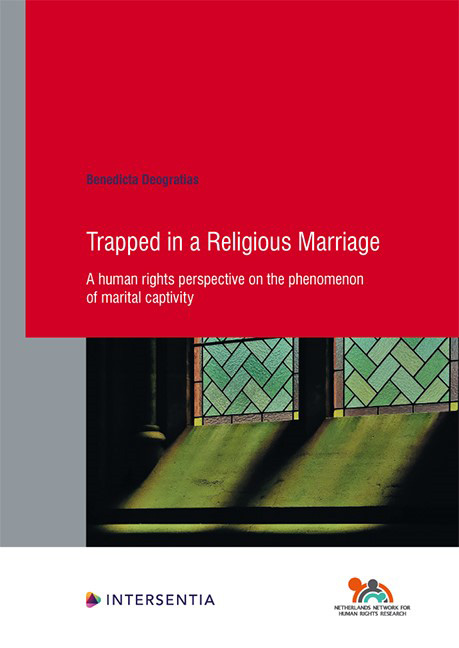Book contents
- Frontmatter
- Contents
- List of Frequently Used Abbreviations
- Chapter 1 Introduction to Marital Captivity
- Chapter 2 Religious Barriers to Divorce
- Chapter 3 Marital Captivity in the Netherlands
- Chapter 4 Marital Captivity and the Freedom of Religion
- Chapter 5 The Right to Divorce
- Chapter 6 The Trapped Spouse’s Rights
- Chapter 7 Violence Against Women
- Chapter 8 Conclusions
- Bibliography
- Curriculum Vitae
- Human Rights Research Series
Chapter 1 - Introduction to Marital Captivity
Published online by Cambridge University Press: 22 December 2020
- Frontmatter
- Contents
- List of Frequently Used Abbreviations
- Chapter 1 Introduction to Marital Captivity
- Chapter 2 Religious Barriers to Divorce
- Chapter 3 Marital Captivity in the Netherlands
- Chapter 4 Marital Captivity and the Freedom of Religion
- Chapter 5 The Right to Divorce
- Chapter 6 The Trapped Spouse’s Rights
- Chapter 7 Violence Against Women
- Chapter 8 Conclusions
- Bibliography
- Curriculum Vitae
- Human Rights Research Series
Summary
Yehudis Smith: ‘Imagine being locked up in a cell, not knowing when you will be released, if ever. Living day in and day out with the fear that you’ll never be able to move on with your life, never be able to find true love, have children, have the life you always thought you’d have, and only being 22 years old. Your husband isn't lost at sea and he's definitely not mentally ill (he knows exactly what he's doing). He walks by your cell daily, dangles the keys in front of you, and walks away; the up-and-down emotional roller coaster of, “maybe today is the day… or maybe I’ll die this way. This is how it feels to be an agunah… an “ungetted woman.” And it doesn't matter if you’re 22, 62, or 82… whether you’re at the beginning of your life with no children, or fighting on your death bed. NOBODY can tell such a woman that she has a choice, for that is the very thing that her husband has taken from her.’
This extract depicts a woman's physical, emotional, psychological and legal struggles after futile attempts to have her religious marriage dissolved. As it turns out, she is forced to remain married against her will. This is a situation which evidently affects every aspect of her life. This peculiar situation is also known as marital captivity.
In contemporary times, the termination of a marriage has become an inevitable truth for an ever-increasing number of relationships. Divorce is generally considered and experienced as an undesirable outcome of the marriage and it is often followed by a tedious time and money consuming process. In many cases, the dissolution of the marriage is eventually realised. However, in certain instances, as illustrated in the case above, one or both couples may not be able to terminate the marriage by way of divorce. The dissolution of a marriage can be hindered by both legal and non-legal factors, such as financial restrictions, social and emotional pressure to remain married, fear of losing a residency permit, religion, and so on. This contribution examines situations in which religion forms a barrier to the dissolution of a marriage.
- Type
- Chapter
- Information
- Trapped in a Religious MarriageA Human Rights Perspective on the Phenomenon of Marital Captivity, pp. 1 - 36Publisher: IntersentiaPrint publication year: 2020

